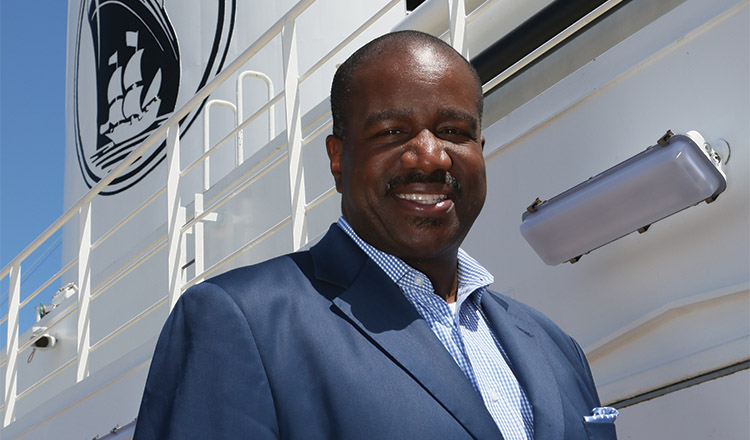Orlando Ashford (T’91, MS T’93) had never been on a cruise when he took over as president of the Holland America line on December 1, 2014. He embarked on his first one four days later. “There are some fun perks to the job,” he says.
A rising star in the corporate world, Ashford was working as the president of the Talent Business Segment at Mercer, a consulting firm based in Indianapolis. His track record drew the attention of Arnold Donald, the CEO of Carnival, Holland America’s parent company.
Donald linked Ashford up with Holland America CEO — and fellow Purdue grad — Stein Kruse (HHS’82), and things fell into place relatively quickly.
Ashford’s history of helping businesses maximize their employees’ talents made him a natural fit for Holland America, which relies heavily on customer service to lure in new business and keep people coming back.
“What was compelling about the cruise industry and Holland America in particular was just that this is a business that’s very human capital intensive,” Ashford says. “We are only as good as the people we are able to attract and position with guests to deliver once-in-a-lifetime types of experiences.”
“We are only as good as the people we are able to attract and position with guests to deliver once-in-a-lifetime types of experiences.”
—Orlando Ashford
Though Ashford received his undergraduate degree in organizational leadership and has experienced a wide variety of situations during his career — including a stint as the head of human resources for 90 European, Asian, and African countries for Coca-Cola — Holland America represents a bit of a new challenge for him.
“I tell people that this industry is almost like six or seven businesses in one,” Ashford says, “because there’s the actual sailing of the cruise, but once you’re on the cruise, there’s so many different experiences that you’re trying to manage. There’s the hotel, there’s the restaurants, there’s on-board retail, there’s shore excursions, there’s a spa, casino — it’s like a little mini city. All these different activities happen on these large floating vessels, and so I’m learning every day.”
While he’s still learning on the job, Ashford is busy trying to get his employees to embrace his vision for the direction of the company. “I tell my team, ‘Our job is to think big, start small, and move fast,’” he says. “So we should have very large ambition — how do we make our cruise line the best at what we do? Having big thoughts, but you have to smart small. So you have that thought, that idea — let’s try it. Let’s test it. Let’s get some feedback. Let’s see what works. Let’s fail fast, and then learn from that and then move to the thing that’s going to actually succeed.”
Ashford has succeeded over the years by working with the people working under him, rather than always suppressing their ideas in favor of his own. “I like to use the term ‘collective intelligence,’” he says, “because a group can always and will always outperform an individual, no matter how smart an individual is.”
Ashford is pretty effective on his own though, too. He has turned his expertise into a book, Talentism: Unlocking the Power of the New Human Ecosystem, and he’s well on his way to completing a second book, although the responsibilities of his new job have had that project on the back burner of late.
When Ashford sets goals for himself, they tend to get accomplished — so it probably won’t be on hold for long.

